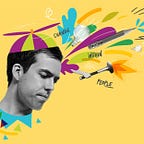The truth about “authentic leadership”
We all know the angry, aggressive boss. Don Draper’s dismissive temper that required his team to win his love. The mythology of Steve Jobs, famously tearing strips off the “fucking dickless assholes” in meetings. We see them as powerful, successful leaders. To be admired, copied.
Through your career you’ve probably been told you need to find our own “leadership style”, which might involve how you dial up or dial down how aggressive you are. How to “lean in” to make yourself heard. People perform better when we demand the best of them. After all — it worked for Steve Jobs, right?
Our recent insight into the qualities of modern business leaders revealed that authenticity is key to a successful 21st century business. It builds trust, inspires creativity and empowers teams.
Many of my clients speak of the people in their past who have become leadership role models to them, but who also cultivated an environment of fear in order to drive performance. They are referred to as “authentic” because of their consistency. With this individual you always knew where you stood. They were direct, critical and demanding. They knew best, and crossing them could be costly.
But here’s the thing:
Being an asshole is not authenticity.
Because bullies are not leaders. They may inspire momentary loyalty, as the fear of displeasing them drives an adrenaline-fuelled performance. We might see them as “walking the talk”, committed to their belief that the way they are is what has gotten them where they are today. Or we put them on a pedestal, and put up with their behaviour, thinking that’s what it takes to win.
These individuals believe success cannot come by simply being human — and so over time they create a persona. A multi-layered story of themselves shaped by their beliefs about the world, typically supported by their position or title which they think affords them a privilege to treat people without respect or dignity.
The mistake we make is in believing they have integrity. That their personality is what got them where they are.
Authenticity is not your personality.
The popular myth is that authenticity gives people license to behave in whatever way they please, because that means they are real and truthful. Express yourself, bring your whole self, just be yourself …
“I am the way I am” often accompanies any declaration of authenticity. This is a statement of distrust and arrogance, says Dr Matthew Budd, author of You Are What You Say (this month’s Within book club selection). “It’s an attitude that inhibits learning — blinding the individual from seeing that they have created a story of themselves”.
The ultimate get out of jail free card. Be “yourself” and stop growing. It’s safer there.
Authenticity is our ability to come back to our very best version of being human.
I say “come back” because somewhere on our life journey most of us seem to lose connection with who we are as humans. We learn aggressive anger, competition, jealousy. And while these states are a part of the experience of being human, they are emotional reactions. They are not the real us.
I feel this disconnection all the time in myself, and in the leaders I coach. More and more I see what it takes to come back to being human. Here’s some examples of authenticity that I’ve seen:
- admitting a firmly held opinion wasn’t helpful
- asking for help and identifying they were stuck
- putting a hand up to say that they had been in a foul mood because of a trigger in a group discussion — and owning that reaction
- identifying that the dynamic between themselves and another senior leader wasn’t working — in front of junior members of their team
- showing excitement at a new opportunity that really meant something personally to them
When you witness or experience these moments for yourself it’s easy to see why authenticity and vulnerability go hand in hand. When we let go of our persona, our trusted story that protects us, we are vulnerable. It’s where we can be most human.
“I don’t think you should be “vulnerable” every day. But there are moments where you need to share your soul and your conscience with people. And show them who you are — and not be afraid of it.”
Howard Schultz
Vulnerability is seen as weakness by those who struggle with authenticity. Their strength is a shield of armour that hides them from being seen. In our working cultures this shows up in leaders who must always have the answer and be the authority figure. If your story about yourself is that you are always right, you haven’t left much room for mistakes. You have shut the door on being human.
Authenticity is acceptance.
It is being aware of who we are in the moment, not trying to present a story about who we think we should be.
It’s not consistency. But it is about integrity. Not always acting the same, but keeping our promises. And when we can’t, admitting we could have.
As authenticity becomes a leadership buzz word we have to consider how we use the term responsibly. It is an essential quality to modern leadership to build trust and connection. A lifelong skill to learn, and a place from which to grow ourselves and our people.
Big thanks to Laurie Bennett for help in putting these thoughts together!
